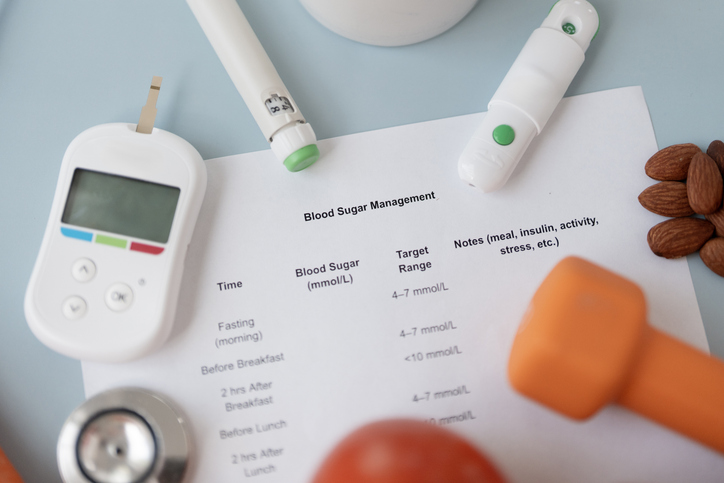Type 2 Diabetes
Type 2 Diabetes
Type 2 Diabetes
Type 2 diabetes is the most common type of diabetes. You can develop type 2 diabetes at any age. There are also steps you can take to prevent diabetes if you’re at risk.
At Carilion Clinic, we can help you prevent and treat type 2 diabetes. We offer all the latest care options, including newer medicines.
Type 2 diabetes is the most common type of diabetes. You can develop type 2 diabetes at any age. There are also steps you can take to prevent diabetes if you’re at risk.
At Carilion Clinic, we can help you prevent and treat type 2 diabetes. We offer all the latest care options, including newer medicines.
Type 2 diabetes is a problem with how your body handles sugar.
You get sugar from your food, which moves from your digestive system to your blood. A hormone called insulin then helps your cells take sugar from your blood and use it.
With type 2 diabetes, your body struggles to use insulin. Even if your body makes insulin, your cells can become insulin resistant.
When the cells can’t use insulin right, the sugar stays in your blood, leading to high blood sugar. Over time, that can create a range of problems in your body.
Type 2 diabetes vs. type 1 diabetes
Type 1 and type 2 diabetes are both diseases that cause people to have high blood sugar.
Type 1 diabetes is an autoimmune condition. The body’s immune system attacks the pancreas, making less insulin. Type 1 tends to develop at younger ages, including childhood.
When type 1 diabetes develops in adults, it can come on slowly and be mistaken for type 2. It’s called latent autoimmune diabetes in adults.
Type 2 diabetes isn't an autoimmune condition. It's when the body’s cells become insulin resistant. Type 2 happens more in adulthood and often comes on slowly. Also, type 1 isn’t preventable the way type 2 often is.
What causes type 2 diabetes?
We don’t know exactly what causes type 2 diabetes. Studies have linked certain lifestyle factors and conditions to a higher risk of developing it.
The main factors linked to a raised risk of type 2 diabetes are:
- Family history: If there’s a history of type 2 diabetes in your family, you may be more likely to get it.
- Age: Your risk goes up after age 45.
- Being overweight: Extra weight, especially around your stomach, can increase your risk.
- Sedentary lifestyle: Studies link not getting enough physical activity to type 2 diabetes.
- Having gestational diabetes: If you had diabetes while pregnant, you’re at risk of having type 2 diabetes later in life. Not everyone with gestational diabetes goes on to develop it. Lifestyle changes can help prevent this progression.
- Smoking: Smoking cigarettes raises your risk of having type 2 diabetes.
What Is Type 2 Diabetes?
Type 2 diabetes is a problem with how your body handles sugar.
You get sugar from your food, which moves from your digestive system to your blood. A hormone called insulin then helps your cells take sugar from your blood and use it.
With type 2 diabetes, your body struggles to use insulin. Even if your body makes insulin, your cells can become insulin resistant.
When the cells can’t use insulin right, the sugar stays in your blood, leading to high blood sugar. Over time, that can create a range of problems in your body.
Type 2 diabetes vs. type 1 diabetes
Type 1 and type 2 diabetes are both diseases that cause people to have high blood sugar.
Type 1 diabetes is an autoimmune condition. The body’s immune system attacks the pancreas, making less insulin. Type 1 tends to develop at younger ages, including childhood.
When type 1 diabetes develops in adults, it can come on slowly and be mistaken for type 2. It’s called latent autoimmune diabetes in adults.
Type 2 diabetes isn't an autoimmune condition. It's when the body’s cells become insulin resistant. Type 2 happens more in adulthood and often comes on slowly. Also, type 1 isn’t preventable the way type 2 often is.
What causes type 2 diabetes?
We don’t know exactly what causes type 2 diabetes. Studies have linked certain lifestyle factors and conditions to a higher risk of developing it.
The main factors linked to a raised risk of type 2 diabetes are:
- Family history: If there’s a history of type 2 diabetes in your family, you may be more likely to get it.
- Age: Your risk goes up after age 45.
- Being overweight: Extra weight, especially around your stomach, can increase your risk.
- Sedentary lifestyle: Studies link not getting enough physical activity to type 2 diabetes.
- Having gestational diabetes: If you had diabetes while pregnant, you’re at risk of having type 2 diabetes later in life. Not everyone with gestational diabetes goes on to develop it. Lifestyle changes can help prevent this progression.
- Smoking: Smoking cigarettes raises your risk of having type 2 diabetes.
Many people with type 2 diabetes have no symptoms or only mild symptoms. It can be a silent disease for many people. They may not know they have high blood sugar until their care team does a blood test.
Symptoms can include:
- Feeling tired
- Feeling hungrier than usual
- Blurred vision
- Being thirstier and urinating more
- Problems with sores not healing
- Numbness in your hands or feet
A routine fasting blood test can check for high blood sugar. Blood work can also check your A1C, which gives an average view of your blood sugar levels over the last 3 months.
Can I reverse my type 2 diabetes?
Some people with type 2 diabetes can reverse their diabetes. They can get to a place where their blood sugar levels are normal, without medication.
Their type 2 diabetes isn’t cured, but it's in remission. However, diabetes can return, so they have to keep monitoring it.
For many people, weight loss reverses their diabetes. For example, people who have bariatric surgery or use weight loss medications can reverse their diabetes.
Making other lifestyle changes can also help you achieve remission. This includes diet changes and increasing your exercise.
Reversing your type 2 diabetes can certainly be a goal. The most important thing is that you work toward keeping your blood sugar levels and A1C healthy.
Can I prevent type 2 diabetes?
There are many things you can do to lower your risk of developing type 2 diabetes. This includes:
- Losing weight: You may be able to prevent or delay diabetes by losing 5 - 7% of your current weight. Carilion has a medical weight loss program.
- Exercising more: Aim to get at least 30 minutes of moderate intensity exercise, at least 5 days per week. Moderate intensity is a brisk walk or bike ride where you pedal against resistance.
- Eating healthier: This means eating fewer calories, but more quality calories. For example, eating lean protein and fiber and drinking less sweetened beverages.
- Quitting smoking: Quitting smoking reduces your risk for numerous diseases.
Type 2 Diabetes Symptoms and Diagnosis
Many people with type 2 diabetes have no symptoms or only mild symptoms. It can be a silent disease for many people. They may not know they have high blood sugar until their care team does a blood test.
Symptoms can include:
- Feeling tired
- Feeling hungrier than usual
- Blurred vision
- Being thirstier and urinating more
- Problems with sores not healing
- Numbness in your hands or feet
A routine fasting blood test can check for high blood sugar. Blood work can also check your A1C, which gives an average view of your blood sugar levels over the last 3 months.
Can I reverse my type 2 diabetes?
Some people with type 2 diabetes can reverse their diabetes. They can get to a place where their blood sugar levels are normal, without medication.
Their type 2 diabetes isn’t cured, but it's in remission. However, diabetes can return, so they have to keep monitoring it.
For many people, weight loss reverses their diabetes. For example, people who have bariatric surgery or use weight loss medications can reverse their diabetes.
Making other lifestyle changes can also help you achieve remission. This includes diet changes and increasing your exercise.
Reversing your type 2 diabetes can certainly be a goal. The most important thing is that you work toward keeping your blood sugar levels and A1C healthy.
Can I prevent type 2 diabetes?
There are many things you can do to lower your risk of developing type 2 diabetes. This includes:
- Losing weight: You may be able to prevent or delay diabetes by losing 5 - 7% of your current weight. Carilion has a medical weight loss program.
- Exercising more: Aim to get at least 30 minutes of moderate intensity exercise, at least 5 days per week. Moderate intensity is a brisk walk or bike ride where you pedal against resistance.
- Eating healthier: This means eating fewer calories, but more quality calories. For example, eating lean protein and fiber and drinking less sweetened beverages.
- Quitting smoking: Quitting smoking reduces your risk for numerous diseases.
At Carilion, our Diabetes Management and Prevention Program helps you get started with managing your diabetes. You’ll meet with our Certified Diabetes Care and Education Specialists. You’ll learn about diabetes and how to stay healthy.
You can live a full and happy life with type 2 diabetes if you follow the care plan your team creates.
Your treatment depends on how severe your diabetes is. If you have pre-diabetes, we may suggest lifestyle changes (like those above).
It’s key for people with diabetes to manage their:
- Blood sugar
- Cholesterol
- Blood pressure
Some people with diabetes may need to take certain medicines. This includes both oral and injectable medicines called GLP-1s. These drugs:
- Help your body release and better use insulin
- Help lower your blood sugar
- Help manage blood pressure and high cholesterol
- May help you lose weight
No matter what your treatment is, your doctor will monitor certain things closely, such as:
- Your heart health
- Your kidney function
- Your eyes
- Your teeth and gums
- Your feet
This is because diabetes can affect many areas of your body.
For people struggling to manage their diabetes, Carilion has a specific program to help. It’s called the Diabetes Performance Improvement Program (DPIP).
People with type 2 diabetes who still struggle to control their blood sugar may need to use an insulin pump. We have a program at Carilion that will train you to use and maintain a pump.
How We Treat Type 2 Diabetes
At Carilion, our Diabetes Management and Prevention Program helps you get started with managing your diabetes. You’ll meet with our Certified Diabetes Care and Education Specialists. You’ll learn about diabetes and how to stay healthy.
You can live a full and happy life with type 2 diabetes if you follow the care plan your team creates.
Your treatment depends on how severe your diabetes is. If you have pre-diabetes, we may suggest lifestyle changes (like those above).
It’s key for people with diabetes to manage their:
- Blood sugar
- Cholesterol
- Blood pressure
Some people with diabetes may need to take certain medicines. This includes both oral and injectable medicines called GLP-1s. These drugs:
- Help your body release and better use insulin
- Help lower your blood sugar
- Help manage blood pressure and high cholesterol
- May help you lose weight
No matter what your treatment is, your doctor will monitor certain things closely, such as:
- Your heart health
- Your kidney function
- Your eyes
- Your teeth and gums
- Your feet
This is because diabetes can affect many areas of your body.
For people struggling to manage their diabetes, Carilion has a specific program to help. It’s called the Diabetes Performance Improvement Program (DPIP).
People with type 2 diabetes who still struggle to control their blood sugar may need to use an insulin pump. We have a program at Carilion that will train you to use and maintain a pump.
At Carilion, we help people manage their diabetes and other endocrine conditions every day. We offer the latest care options and tools close to home.

Researching new treatments
Our partnership with Virginia Tech Carilion School of Medicine means we’re always researching new ways to treat diabetes and improve care. We even conduct research focused on people with diabetes in southwestern Virginia.
Why Choose Carilion Clinic?
At Carilion, we help people manage their diabetes and other endocrine conditions every day. We offer the latest care options and tools close to home.
Health and Wellness

Diabetes Research Offers Immediate and Long-Term Benefits

The 4 M's of Diabetes Management

Where Is Sugar Hiding?
Get Care at Carilion Clinic
Treating the people of western Virginia for more than 70 years, we're proud to continue bringing the latest endocrine treatments to our community. We're working to make it easier than ever to connect with us and find the care you need.
Get Care at Carilion Clinic
Treating the people of western Virginia for more than 70 years, we're proud to continue bringing the latest endocrine treatments to our community. We're working to make it easier than ever to connect with us and find the care you need.
Get Care at Carilion Clinic
Treating the people of western Virginia for more than 70 years, we're proud to continue bringing the latest endocrine treatments to our community. We're working to make it easier than ever to connect with us and find the care you need.
Get Care at Carilion Clinic
Treating the people of western Virginia for more than 70 years, we're proud to continue bringing the latest endocrine treatments to our community. We're working to make it easier than ever to connect with us and find the care you need.

